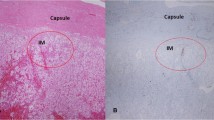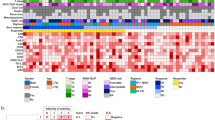Abstract
Recent development on the fields of molecular genetics and immunology of human renal cell carcinoma (RCC) have resulted in more successful treatment of advanced and metastatic RCCs. Re-evaluation of the prognostic/predictive data aim the initial tumor staging of RCC patients to achieve better patient selection for immune and gene therapy. 125 RCC patients diagnosed according to the Heidelberg histological classification, graded, Robson staged, immune treated (Interferon-α + Vinblastin or Broncho-Waxom/Decaris) were followed-up clinically for 36 months. Tumor immunity markers by immunohistochemistry of tumor infiltrating lymphocytes (TIL) were detected by immunoperoxidase methods using monoclonal antibodies. Tumoral immune complexes (TIC) were visualized by fluorescent polyclonal antibodies. Histologically oncocytomas defined a better (p<0.02) and sarcomatous RCCs a worse (p<0.01) follow-up prognosis. Basically, the metastatic status (related with the stage and grade) determined the clinical outcome (p<0.00002) of the RCC patients. Tumoral immune complexes (TIC) were weak positive, while tumor infiltrating lymphocytes (TIL) weak negative predictors of the succes of Broncho-Waxom/Decaris immune therapy. Molecular genetic based histological classification, grade, stage and metastatic status parameters together with some tumor immunity parameters (TIL, TIC) can predict the success of immunotherapy of RCC patients.
Similar content being viewed by others
Abbreviations
- RCC:
-
renal cell carcinoma
- onc:
-
oncocytic
- chr:
-
chromophobe
- pap:
-
papillary
- mixed:
-
mixed type
- NP:
-
non-papillary; sarcomatous
- met:
-
metastasis
- std:
-
stage
- grd:
-
grade
- VHL:
-
von Hippel Lindau gene
- TIL:
-
tumor infiltrating lymphocytes
- TIC:
-
tumoral immune complexes
- IL-2:
-
interleukin-2
- LAK:
-
lymphokine activated killer cells
- IFN-γ:
-
interferon-γ
- NK-cells:
-
natural killer cells
- MHC:
-
major histocompatibility complex
- IFN-α + VINBL therapy:
-
Interferon-α2b (Intron-A) + Vinblastin treatment
- B/D-therapy:
-
BronchoWaxom/Decaris treatment
- PD:
-
progressive disease
- SD:
-
stable disease
- PR:
-
partial response
- CR:
-
complete response
References
Angevin E, Kreme, F, Gaudin C, et al: Analysis of T-cell immune response in renal cell carcinoma: polarisation to type 1-like differentiation pattern, clonal T-cell expansion and tumor-specific cytotoxicity. Int J Cancer 72:431–440, 1997.
Belldegrun A, Tao CL, Kaboo R, et al: Natural immune reactivity-associated therapeutic response in patients with metastatic renal cell carcinoma receiving tumor-infiltrating lymphocytes and interluekin-2-based therapy. J Immunother Tumor Immunol 19:149–161, 1996.
Bezooijen van RL, Goey H, Stoter G, et al: Prognostic markers for survival in patients with metastatic renal cell carcinoma treated with interleukin-2. Cancer Immunol Immunother 43:293–298, 1996.
Brouwenstijn N, Gaugler B, Kruse KM, et al: Renal-cell carcinoma-specific lysis by cytotoxic T-lymphocyte clones isolated from peripheral blood lymphocytes and tumor infiltrating lymphocytes. Int J Cancer 68:177–182, 1996.
Buszello H, Ackermann R: Immunohistochemical studies on the expression of HLA Class I antigen in renal cell carcinoma: comparison of primary and metastatic tumor tissue. Eur Urol 25:158–163, 1994.
Buzogány I, Czvalinga I, Götz F: Ambulanter végzett interferon monoés kombinációs terápia eredménye elôrehaladott vesedaganat esetén. Orv Hetil 138:67–70, 1997.
Chang AE, Aruga A, Cameron MJ, et al: Adoptive immunotherapy with vaccine-primed lymph node cells secondarily activated with anti-CD3 and interleukin-2. J Clin Oncol 15:796–807, 1997.
Corless CL, Kibel AS, Iliopoulos O, et al: Immunostaining of the von Hippel-Lindau gene product in normal and neoplastic human tissues. Hum Pathol 28:459–463, 1996.
Crotty TB, Farrow GM, Liber HJ: Chromophobe cell renal carcinoma: clinicopathological features of 50 cases. J Urol 154:964–967, 1996.
Curnow RT: Clinical experience with CD64-directed immunotherapy. An overview. Cancer Immunol Immunther 45:210–215, 1997.
Hove van den LE, van Gool SW, van Poppel, et al: Phenotype, cytokine production and cytolytic capacity of fresh (uncultured) tumor-infiltrating T lymphocytes in human renal cell carcinoma. Clin Exp Immunol 109:501–509, 1997.
Hove van den LE, van Gool SW, van Poppel, et al: Identification of an enriched CD4+ CD8alpha++ CD8beta+ T-cell subset among tumor-infiltrating lymphocytes in human renal cell carcinoma. Int J Cancer 71:178–182, 1997.
Jantzer P, Schendel DJ: Human renal cell carcinoma antigenspecific CTLs: antigen-driven selection and long-term persistence in vivo. Cancer Res 58:3078–3086, 1998.
Kawata N, Akimoto Y, Hirano D, et al: Immunological effect of recombinant interferon-gamma on tumor infiltrating lymphocytes of renal cell carcinoma - relationshship with clinical stage (Japanese). Hinyokika-Kiyo 42:1–4, 1996.
Knebelman B, Ananth S, Cohen HT, et al: Transforming growth factoc alpha is a target fro the von Hippel-Lindau tumor suppressor. Cancer Res 58:226–231, 1998.
Kovacs Gy, Akhtar M, Beckwith BJ, et al: The Heidelberg classification of renal cell tumors. J Pathol 183:131–133, 1997.
Kovacs Gy, Erlandsson R, Boldog F, et al: Consistent chromosome 3p deletion and loss of heterozygositiy in renal cell carcinoma. Proc Natl Acad Sci USA 85:1571–1575, 1988.
Kowalczyk D, Skorupski W Kwias Z, et al: Flow cytometric analysis of tumor-infiltrating lymphocytes in patients with renal cell carcinoma. Br J Urol 80:543–547, 1997.
Krumm A, Groudine M: Tumor suppression and transciption elongation: the dier consequences of changing partners. Science 269:1400–1401, 1995.
Licht MR, Novick AC, Tubbs RR, et al: Renal oncocytoma: clinical and biological correlates. J Urol 150:1380–1383, 1993.
Lubensky IA, Schmidt L, Zhuang Z, et al: Hereditary and sporadic papillary renal carcinomas with c-met mutations share a distinct morphological phenotype. Am J Pathol 155:517–526, 1999.
Magyarlaki T, Kiss B, Buzogány I, et al: Renal cell carcinoma and paraneoplastic IgA nephropathy. Nephron 82:127–130, 1999.
Magyarlaki T, Mosolits S, Baranyay F, et al: Immunohistochemistry of complement responses on human renal cell carcinoma biopsies. Tumori 82:473–480, 1996.
Moch H, Schraml P, Bubendorf L, et al: Intratumoral heterogeneity of von Hippel-Lindau gene deletions in renal carcinoma detected by fluorescence in situ hybridization. Cancer Res 58:2304–2309, 1998.
Neumann HPH, Bender BU, Berger DP, et al: Prevalence, morphology and biology of renal cell carcinoma in von Hippel-Lindau disease compared to sporadic reanl cell carcinoma. J Urol 160:1248–1254, 1998.
Olive C, Nikol D, Falk MC: Characterisation of gamma delta T cells in renal cell carcinoma patinets by polymerase chain reaction analysis of T cell receptor transcripts. Cancer Immunol Immunother 44:27–34, 1997.
Siemeister G, Weindel K, Mohrs K, et al: Reversion of deregulated expression of vascular endothelial growth factor in human renal carcinoma cells by von Hippel-Lindau suppressor protein. Cancer Res 56:2299–2301, 1996.
Surfus JE, Hank JA, Oosterwijk E, et al: Anti-renal-cell carcinoma chimeric antibody G250 facilitates antibody-dependent cellular cytotoxicity with in vitro and in vivo interleukin-2-activated effectors. J. Immunother Tumor Immunol 19:184–191, 1996.
Toliou T, Stravoravd P Polyzonis M, et al: Natural killer cell activation after interferon administration in patients with metastatic renal cell carcinoma: an ultrastructural and immunohistochemical study. Eur Urol 29:252–256, 1996.
Vogelzang NJ, Stadler WM: Kidney cancer. Lancet 352:1691–1696, 1998.
Weijtens ME, Willemsen RA, van Krimpen BA, et al: Chimeric scFv/gamma receptor-mediated T-cell lysis of tumor cells is coregulated by adhesion and accessory molecules. Int J Cancer 77:181–187, 1998.
Author information
Authors and Affiliations
Corresponding author
Additional information
This work was supported by the grants of the Hungarian Academy of Sciences (BOLYAI-BO00049/99 and OTKA-T0220986)
Rights and permissions
About this article
Cite this article
Magyarlaki, T., Buzogány, I., Kaiser, L. et al. Prognostic histological and immune markers of renal cell carcinoma. Pathol. Oncol. Res. 7, 118–124 (2001). https://doi.org/10.1007/BF03032577
Received:
Revised:
Accepted:
Issue Date:
DOI: https://doi.org/10.1007/BF03032577




